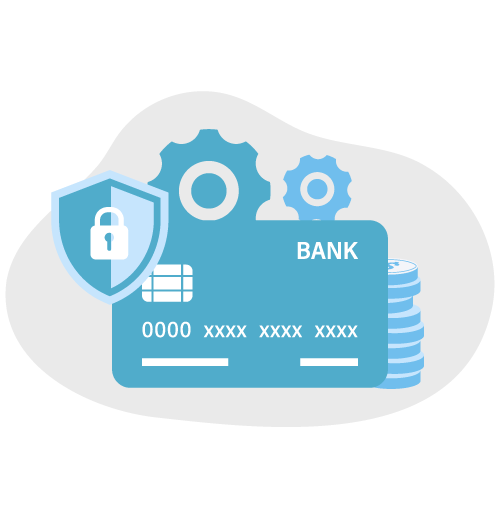PCI Compliance Services.
Globally recognized framework designed to protect payment account and cardholder data.
certified PCI QSAs simplify compliance & reporting for PCI DSS.
GraVoc’s PCI compliance services focus on the assessment, remediation, and certification of your information assets and network security. Our certified PCI Qualified Security Assessors (QSAs) can validate your company’s compliance with Payment Card Industry Data Security Standard (PCI DSS) and deliver a Report on Compliance (RoC).
Drawing from over 20 years of cybersecurity experience, we review the scope of your payment operations and deliver a simplified, tailored PCI compliance strategy to help your business meet all the requirements. Our team is your trusted partner throughout the accreditation process, offering the full suite of services you need to achieve and maintain PCI compliance.
GraVoc’s PCI Compliance Services
Benefits of PCI Compliance Services
PCI DSS Compliance FAQ
GraVoc’s PCI compliance services.
PCI DSS Consulting & Gap Analysis
Our expert consultants can perform a thorough PCI DSS gap analysis to identify areas of non-compliance with the framework’s requirements.
As your trusted compliance partner, we review your cardholder environment, firewall configuration, passwords, audit logs, data retention policies, data encryption, and other security infrastructure components against PCI DSS requirements. At the end, we provide you with a detailed report that includes our findings and recommendations for remediation of any gaps and weaknesses.
PCI SAQ Consulting
Besides performing a thorough gap analysis, our certified QSAs can also assist your business with completing the required PCI Self-Assessment Questionnaire (QSA) and provide documentation to demonstrate compliance.
PCI RoC Audit
Our QSAs are certified by the PCI SSC to conduct a detailed audit of your security programs to assess and report on your business’ compliance with PCI DSS requirements. This includes an on-site assessment of your physical access controls to protect cardholder data.
PCI Documentation
Our team can assist your business with completing documentation for PCI DSS compliance requirements, such as a PCI Written Information Security Program (WISP) and Incident Response Plan (IRP).
PCI Risk Assessment
GraVoc can perform annual risk assessments of your business’ processes and technology as required by PCI DSS requirements. During this review, our cybersecurity team can identify and mitigate any security gaps in how you store and transmit cardholder data.
PCI Internal & External Penetration Testing
Using advanced tools and technologies, our skilled team can perform thorough internal and external penetration testing of your cardholder data environment (CDE) as defined by the PCI DSS requirements.
our information security certifications include...

benefits of PCI compliance.
Accelerate and simplify PCI compliance with expert assistance from our certified QSAs.
Align with industry security standards.
Avoid heavy costs of non-compliance.
Maximize protection of your cardholder data against breaches by eliminating security gaps.
PCI DSS compliance FAQ
What is PCI DSS?
The PCI DSS is a globally recognized framework of technical and operational security requirements developed to protect the confidentiality and integrity of payment account data.
The Standard is maintained by the PCI SSC and global payment industry stakeholders, such as American Express, Mastercard, and Visa. The framework was designed in response to increasing credit card fraud in the face of rising eCommerce and cashless transactions.
PCI Compliance Checklist
The PCI DSS provides 12 baseline requirements for compliance, including:
- Apply security configurations to all systems.
- Install and maintain network security controls, such as firewalls and cloud access controls.
- Protect stored account data.
- Identify and authenticate user access to system components.
- Log and monitor access to cardholder data. This helps detect any suspicious activity and support forensic analysis.
- Restrict access to systems and cardholder data by need to know.
- Develop and maintain secure systems and software, which includes staying current with vendor-provided security patches.
- Protect cardholder data with strong cryptography.
- Protect all systems and networks from malicious software.
- Limit physical access to cardholder data.
- Test security of systems and networks regularly.
- Support information security with policies and programs.
Read more about this topic on our blog post: What are the 12 PCI DSS Requirements for Compliance?
What is the difference between PCI SAQ and RoC?
An SAQ is a self-assessment questionnaire that you can fill out to showcase PCI compliance. Based on your merchant environment, you can choose the relevant SAQ. For instance, SAQ-D is designed for service providers.
A RoC, on the other hand, requires a more detailed assessment and documentation by a certified QSA, such as our team at GraVoc. Whether you need an SAQ or RoC usually depends on your business’ volume of card transactions or requirements issued by your acquiring bank and other stakeholders.
Who needs PCI Compliance?
PCI DSS compliance requirements apply to all merchants and service providers – small or large – that store, process, and transmit cardholder data, such as expiration date and primary account number, as well as sensitive authentication information, such as card verification codes or PINs.
If a business outsources payment operations to a third-party service provider, it remains responsible for ensuring that the data is protected as per PCI DSS guidelines.
What are the PCI non-compliance penalties & fees?
PCI DSS compliance is not legally mandated. However, it is often a contractual obligation issued by card brands or acquiring banks. In the event of a breach or card fraud, payment processors and card companies can levy thousands of dollars in penalties on merchants that fail to establish PCI compliance.
How to prove PCI DSS compliance?
A signed Attestation of Compliance (AOC) that demonstrates the results of your PCI DSS assessment serves as proof of your company’s PCI compliance, along with the required SAQ or RoC.
let’s talk about PCI DSS compliance.
Do you have a question or want to discuss our PCI compliance services?
Contact a GraVoc employee by filling out the form below.
